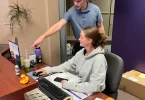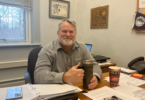By Jenna Juarez
Bluffton University’s annual Civic Engagement Day brought about 25 different student and faculty presentations—three being done by Dr. Melissa Friessen’s Theatre for Social Change class. The 10 a.m. presentation of an Interactive Workshop on Gender Expectations, opened a discussion about past and present perspectives of gender.
The Theatre for Social Change students chose their presentation topic from many social justice issues.
“I think gender discrimination is really known but we don’t talk about it as much,” said Summer Lofton, a first-year social work major and presenter. “We’d like to give notice that it’s still happening. We have to find new ways to bring awareness and try to discuss the situation.”
At the beginning of the workshop, several warmup activities were performed, followed by presenters performing a role-playing scene involving a discussion of gender expectations between generations.
Presenters Summer Lofton, Dylan Thomas, and Kenneth Dadzie presented their workshop in a format planned by Friesen in the Theatre for Social Change course.
“Each group kind of developed their own activating scene,” said Friesen. “We built that structure up piece by piece throughout the semester and practiced in class to do this whole selection, 45 minutes.”
First-year English major Jordyn Garmatter was unsure what this workshop would be like but found the interactive nature helpful in creating discussion.
“I think that they did very well,” said Garmatter “I think that the use of the scene that they did at the very end was a good tool for how we can address difficult situations.”
Friesen touched on how theatre techniques can help in creating authentic conversations, the theme of this Civic Engagement Day.
“Well, the way the workshop is supposed to be designed, which they did really well, is to encourage active participation form the jump,” said Friesen. “It just loosens up your body and your emotions and your intellect all at once.”
“The authentic part is [the audience] actually providing the solutions. That’s their own thoughts, that’s their own feelings,” said Lofton. “That’s what we like to do—is have everyone in the conversation here.”
Editor’s note: This article was produced as part of an assignment for MED 225 Writing for the Media.






